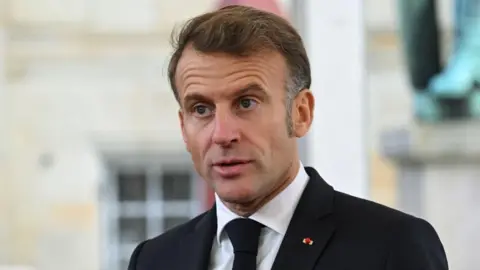In the heart of Paris, along the storied banks of the Seine, President Emmanuel Macron walked alone Monday – a solitary figure whose political isolation now mirrors his physical solitude. The scene speaks volumes about the current state of French democracy, where a once-mighty centrist coalition is showing dangerous signs of fracture.
Like a house of cards in a gentle breeze, Macron’s carefully constructed political apparatus is wavering. When former Prime Minister Édouard Philippe – a man who stood shoulder-to-shoulder with Macron during the administration’s early triumphs – suggests calling early presidential elections, well folks, that’s what we in journalism call a watershed moment.
Philippe’s proposition isn’t just political maneuvering; it’s a stark admission that France’s governmental machinery has ground to a concerning halt. The numbers tell the tale: three prime ministers in twelve months, each resignation another crack in the foundation of Macron’s presidency.
The latest casualty, Sébastien Lecornu, handed in his resignation Monday after failing to cobble together a working government. Macron has given him until Wednesday to perform what many see as political alchemy – transforming discord into stability. But as any seasoned observer of French politics can tell you, that’s about as likely as finding a Texas snowball in August.
What’s particularly telling is the chorus of criticism now emanating from Macron’s inner circle. Gabriel Attal, who led Macron’s Renaissance party and served as prime minister for a brief six months, took to national television with words that would have been unthinkable just months ago. “I no longer understand the decisions made by the president,” Attal declared, suggesting it’s time to “try something else.”
The 47-year-old Macron, once the wunderkind of European politics, now finds himself in a position that would make even the most seasoned political operator uncomfortable. Until recently, calls for his resignation came primarily from the fringes – the far left and hard right of French politics. But when your own political family starts suggesting it’s time to pack up and go home, that’s what we might call a genuine crisis of leadership.
This situation brings to mind an old saying we have back in Texas: when you’re riding ahead of the herd, take a look back every now and then to make sure it’s still there. Macron, it seems, may have lost sight of his herd entirely.
The question now isn’t just whether Macron can weather this storm, but whether France’s Fifth Republic system can adapt to these new political realities. As this crisis unfolds, one thing is certain: the next few days will be crucial in determining whether French democracy can find its footing or if it’s headed for even choppier waters.


